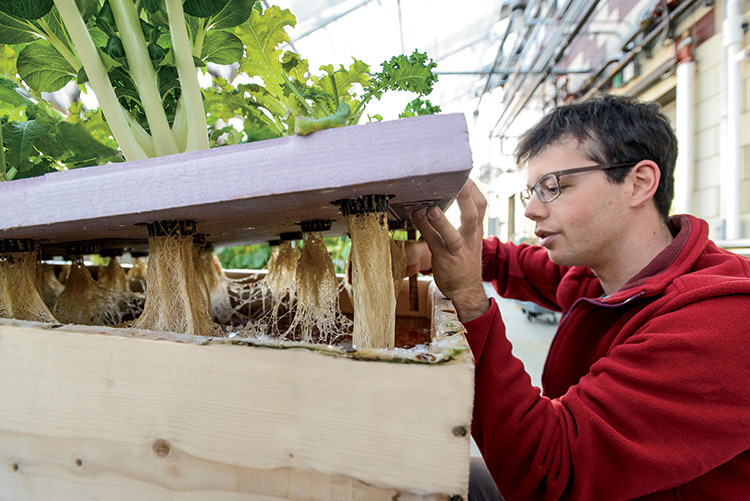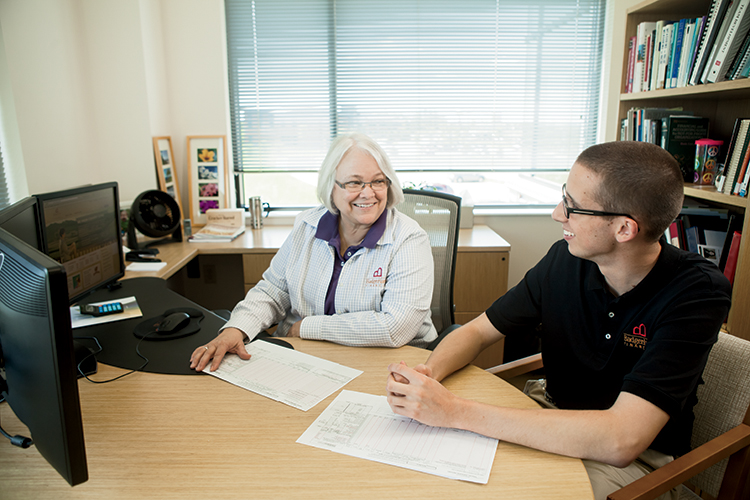Home > Wisconsin > Wisconsin Ag Education > Growing Wisconsin Agriculture Careers
Growing Wisconsin Agriculture Careers
In partnership with: Wisconsin Department of Agriculture, Trade and Consumer Protection.

As a farm kid in southern Wisconsin, Luke Drachenberg always knew he wanted to be involved in agriculture. His challenge: Choosing a specific career.
“There are so many different opportunities in agriculture,” says Drachenberg, a junior studying agriculture business management and economics at the University of Wisconsin-Madison. “I feel many people nowadays think they hear College of Agriculture and Life Sciences and say, ‘You want to be a farmer.’ There is a disconnect between what people think we do and the wide variety of career options available.”
Rather, Drachenberg wants to work in agriculture finance. The truth is, few students studying agriculture today will farm. Agriculture jobs range from research to nutrition to global trade. One in every 9 jobs in Wisconsin is related to agriculture, according to a report compiled by the University of Wisconsin Extension. The state’s agriculture industry contributes $88.3 billion to the economy annually and provides 413,500 jobs across Wisconsin’s 72 counties. Meanwhile, every job in agriculture supports another 1.46 jobs elsewhere in Wisconsin, according to the report. A variety of businesses, processors, manufacturers, genetics research labs and transportation companies together support the Badger State’s agricultural infrastructure.
“Agriculture is a tremendously stable field,” says Ray Cross, president of the University of Wisconsin System. “It probably isn’t growing as fast as a couple of other high-tech sectors, but it is very stable and it’s going to be increasingly important to the future of our country and to our state. I can understand why students are attracted to this field.”
Ag Enrollment Trends Upward
Student enrollment in agriculture programs climbed 40 percent over the last 10 years at the University of Wisconsin- Madison College of Agricultural and Life Sciences, says Heidi Zoerb, an assistant dean of the college.
Specifically, seven agricultural programs have experienced more than a 50 percent surge in enrollment in just the last five years. Those include Agricultural and Applied Economics, Biological Systems Engineering, Community and Environment Sociology, Food Science, Forest Science, Life Sciences Communication and Microbiology.
As of 2013, biology became the single largest undergraduate major at UW -Madison, Zoerb says. The majority of students who major in biology are in the College of Agricultural and Life Sciences.
“In a lot of ways, the lines between what we traditionally thought of as an agricultural career and biological science career are not as obvious as they once were,” she says. “The tools and methods for plant and animal breeding now are similar to the same kinds of tools that you would use if you were a computer programmer.”

Forward-Thinking Career Prep
With these increasing career opportunities in agriculture, the three University of Wisconsin campuses offering agriculture programs and degrees have adjusted their approach to agriculture programs, Cross says.
“You’re seeing a greater emphasis on fundamental education in the sciences, which are foundational to just about any career,” he says.
Students at UW -Madison, Platteville and River Falls also experience an expanded emphasis on business principles. Meanwhile, researchers spend more time on fundamental research to improve productivity and efficiency on farms, Cross adds.
A junior this fall at UW Madison, Kate Griswold already has held three internships, including with industry giants John Deere and DuPont Pioneer. She is studying life sciences communication.
“I think a lot of people in other parts of the university might not be as optimistic about a career in their chosen area,” she says. “But I’m very optimistic about a career in agriculture. It’s exciting to be in an industry with so many different opportunities. I’m optimistic about getting a job when I’m out of college.”




![Wisconsin Ag Career [INFOGRAPHIC]](https://eadn-wc01-4177395.nxedge.io/wp-content/uploads/2020/05/Screen-Shot-2014-10-22-at-10.31.20-AM.png)